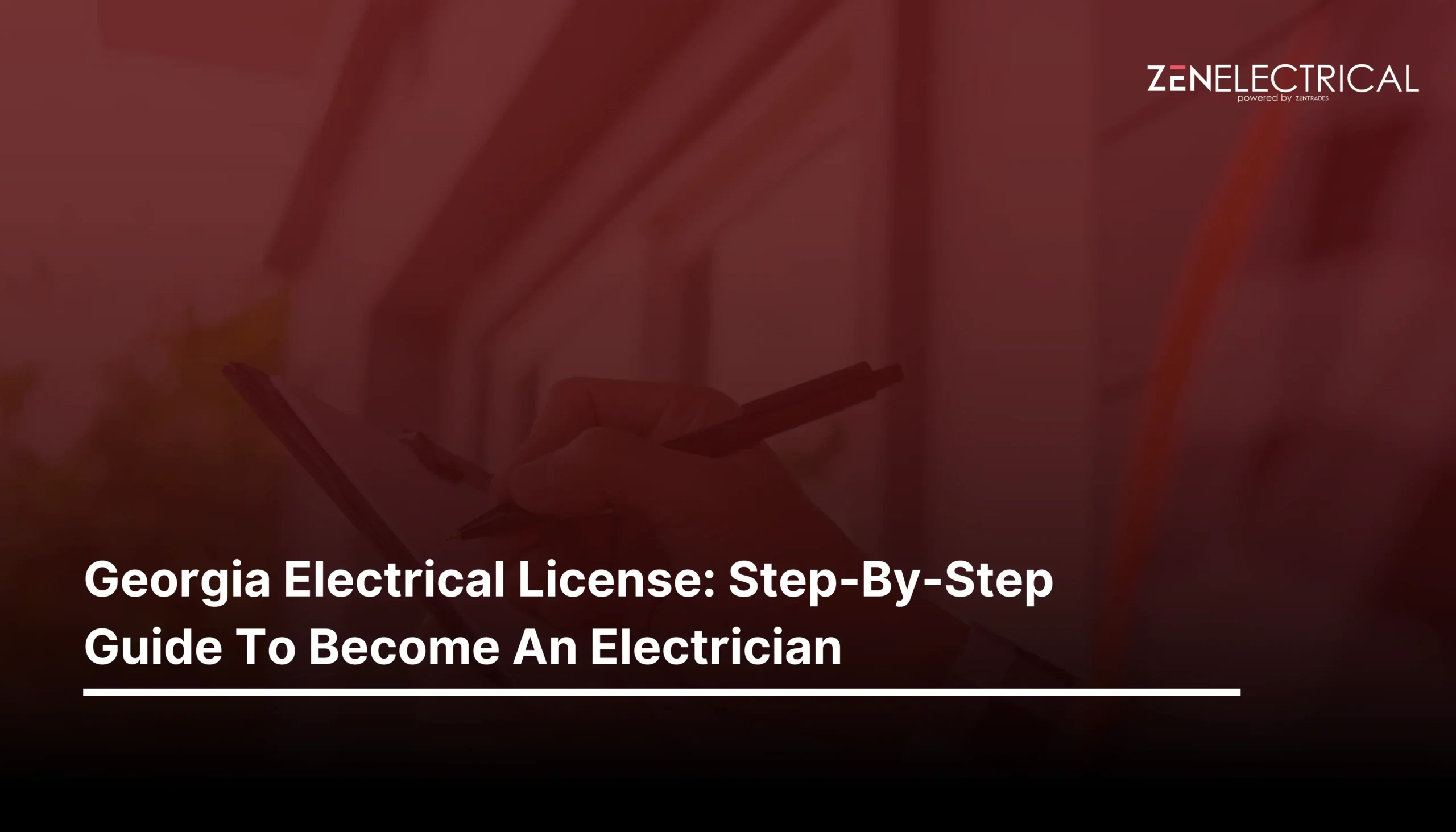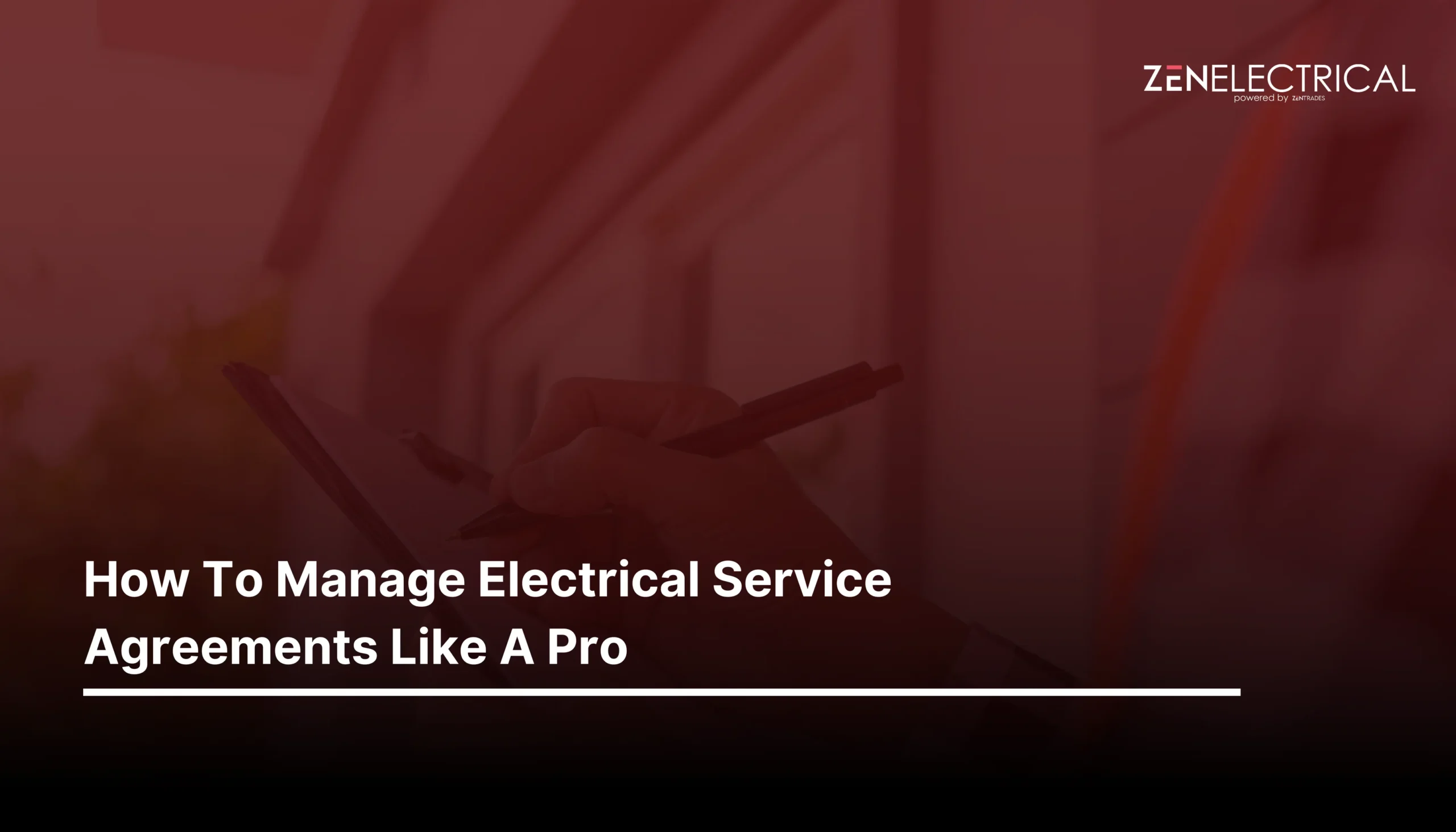Georgia Electrical License: Step-By-Step Guide To Become An Electrician
- Field Service Management
- 9 Min Read
An excellent career option, being an electrician, is more than a job. Electrical contractors have a variety of job choices and make a respectable living. Additionally, there is employment security because clients will always need trained tradespeople to construct and maintain electrical systems in their residences and places of business.
According to the U.S. Bureau of Labor Statistics, there are 711,200 electricians employed nationwide, of whom 19,010 are located in Georgia. According to projections, over 50,000 more people will join the ranks of this skilled profession nationally between 2021 and 2031. According to CareerOneStop, the U.S. Department of Labor’s job search website, the growth rate is predicted to be greater in Georgia, at 11%.
Finding experienced tradespeople is a nationwide search for many contractors. According to the Associated General Contractors of America’s 2020 AGC-Autodesk Workforce Survey, hourly craft roles, including plumbers, electricians, and HVAC technicians, were unfilled in 60% of American businesses and 63% of companies in Georgia. You will therefore have a wide selection of employment to choose from when you’re ready if you receive the required training.
Although being an electrician takes time, you are compensated for your efforts as you learn and develop your skills.
Do you want to expand your electrical company? Schedule a personal demo with ZenElectrical now!
Here What We Cover
What does an electrician do? What are their skills?
Electricians install, maintain, and repair electrical power system components in buildings and other structures. Electrical work involves communication, lighting, and control systems in enterprises, commercial facilities, and homes.
Electricians deal with the installation and upkeep of the lighting system and inspect electrical parts such as circuit breakers, electrical wiring, and controls. They must use hand and power tools to fix or upgrade the equipment, wiring, and fixtures.
They must be in charge of managing and instructing additional electrical workers. They have to interpret designs showing where outlets, circuits, and other equipment are located in buildings. They also employ testing tools to find electrical flaws.
The National Electrical Code, which forms the basis of local and state building regulations, must be followed by electricians. When buildings are still being built, they might work there, installing wiring and other equipment before it is hidden behind walls.
Electricians who maintain machinery must locate and fix broken machinery.

Use our free Invoice template now
Make winning quotes in minutes—for any industry and any job.
How do you know you are qualified to become an electrician?
To become an electrician, you must have the following prerequisites:
To qualify, you must meet the following requirements:
- Be at least 18 years old
- Have a high school diploma or GED
- Be in good physical condition
- Have dependable transportation to and from school and workplaces
- Be able to work both independently and in a group
- And be able to follow directions.
Depending on your state, there may be other criteria you need to fulfill before beginning your career as an electrician. Information about how to obtain a electrical license in Georgia is provided in this article.
Steps on how to get an electrical license in Georgia
An electrical license applicant in Georgia should have at least four years of experience.
To gain practical experience, you can sign up for an electrical apprenticeship program in Georgia.
Under the supervision of a certified electrician, you will conduct a range of electrical tasks as an apprentice.
Apprenticeship programs for electricians in Georgia:
- Technical College System of Georgia
- IEC Apprenticeship Program
- IBEW Local Union 613 Apprenticeship Program
Information about the Georgia electrician apprenticeship program: Georgia has $25–$50 application fees. A trade school or community college might cost up to $10,000 for electrical training.
Students can typically find financial aid choices at accredited institutions and trade schools. Some apprenticeships are sponsored and funded. It is required to undergo classroom-based electrician courses.
Prerequisites for an electrical apprenticeship in Georgia:
- You must be at least 18 years old to sign up for an apprenticeship.
- possess the physical ability to accomplish the work
- passing the test for general aptitude
- a class in Algebra I that you took and passed
- Observe a job interview
Work Experience:
- Fix electrical issues
- Install and connect the wires.
- Electrical wiring in existing homes should be replaced and repaired.
- Under the supervision of a certified electrician, do all tasks.
Information about the Georgia licensing examination
Candidates must receive at least a 70% on their tests. Each exam costs $259 to take. PSI/AMP is in charge of testing.
Three times a year, the electrician exams are presented. The exam is open-book.
The following topics are included in Georgia electrical exams:
- Safety
- Basic Electrical Knowledge
- Branch circuits, feeders, and services
- A Raceway and an Enclosure
- Motors and controls by grounding and bonding
Tools for Exam Preparation:
- Master Exam Prep
- Georgia Electrical Exam – Tests.com
- Unbiased Electrical Test
Types of Georgia Electrical licences
Georgia issues the following various electrical licenses:
- First Class Electrical Contractor
- Contractor Class II for Electrical
Class I license holders for electrical contractors in Georgia are permitted to install, modify, and repair electrical equipment, control systems, and electrical wiring for installations that use just one phase of electricity. Candidates for this license must:
- Minimum age of 21
- Achieve success on a test
- Get your application for the electrical exam approved
- A high school diploma or a GED
- Have four years or more of experience working in the electrical industry
Class II license holders for electrical contractors in Georgia are permitted to install, maintain, and fix electrical wiring, control systems, and equipment. Holders of a Class II license may carry out electrical work of any scope and size. Candidates must:
- Have completed 21 years of age.
- Take and pass the test.
- Obtain permission to take the electrical exam.
- Possess a GED or high school diploma.
- Four or more years of experience working in the electrical industry.
- The Georgia Board of Electrical Contractors grants licenses. The cost of a licence ranges from $75 to $150.
Georgia electricians make an hourly average of $20.36.
Get posts like this in your inbox.
Keep learning how to run a 5-star business with our bi-weekly newsletter.
Benefits of Becoming a licenced Electrician in Georgia
The following are just a few advantages of becoming a certified Georgia electrician:
- Most importantly, you must first obtain state certification to undertake electrical work in Georgia lawfully.
- A trade license demonstrates your expertise and experience.
- Only licensed electricians can bid on public and government projects, establish a business, market their services, secure commercial insurance, obtain building permits, and pass inspections.
- Licensing safeguards both your business and your clients.
- Certification as an electrician provides you a leg up in the employment market.
- Your potential for generating money is also increased
FAQs
Should I enlist in a union for electricians in Georgia?
Dues must be paid to join a union representing Georgia electricians.
However, these dues come with a wealth of advantages for union members. In-house health insurance is provided to 93% of union members.
Compared to non-union electricians, union electricians make more money. A pension plan, paid time off for vacations, and sick days are further union perks.
Georgia electrician insurance
The job of an electrician entails dangers. Electrical currents can burn and shock people. Working in confined areas is a requirement for electricians. Electricians frequently lose their balance while working on roofs and ladders.
Electricians must have insurance before being hired to do any electrical work in Georgia. Insurance carried by employers protects employees. Electricians who work by themselves must finance their liability insurance.
Zoom Drain
Franchises of Zoom Drain provide home and business sewage and drain cleaning services, as well as commercial drain maintenance services. Unlike a regular plumbing business, the firm claims its specialized services fill a market gap.
Norristown, Pennsylvania-based Zoom Drain seeks franchisees with management experience, strong leadership, organizational abilities, and a commitment to providing excellent customer service.
Franchise owners must have a $300,000 net worth and $100,000 liquid assets. According to the company, startup costs typically range from $208,475 to $252,969. However, they differ depending on your background, if you already own a business, and the cost of living in your target market.
Bluefrog Plumbing and Drain
Emergency plumbing services, gas leak repair, and other plumbing and drain services are all provided by Bluefrog Plumbing + Drain for both business and residential customers.
To start a new company, prospective Bluefrog Plumbing + Drain franchisees must have a minimum of $45,000 in liquid cash. According to the corporation, a Bluefrog Plumbing + Drain franchise can be opened for anywhere between $127,130 and $370,915.
According to the business, franchisees profit from a simple business strategy that is easy to scale.
A membership-based business model that creates more planned work, mentorship, financial coaching, continuous support for digital marketing, staffing aid to hire the best plumbers, and in-person and online training is also helpful to them.
ACE Duraflow Systems
Santa Ana, California-based Ace DuraFlo developed and commercialized a permanent cure for pipe corrosion in the 1990s. Repiping is an option, but its ePIPE system also provides in-place pipe restoration technology.
With the help of Ace DuraFlo franchises, companies can provide pressurized piping systems on residential, commercial, industrial, and government premises with pipe restoration services for corrosion and leaks.
To learn more about franchising opportunities, plumbing companies can contact the business.
Benefits of starting a plumbing franchise.
Compared to an independent business, having a franchise might have many advantages. Here are some of the main benefits for plumbing franchise owners as opposed to those who choose to go it alone.
Popularity: When choosing a service provider, people prefer to work with people they are familiar with, mainly when those services include an unfamiliar person entering their house. This is known as the “name recognition” principle.
Most of the time, franchises have well-known brand names that have existed for a long time. You will be granted the right to use the plumbing franchise’s terms, trademarks, and logo you purchase.
Training and Support: The training offered by all franchises is a well-liked element. Franchisees will use the franchisor’s computer systems, operations manual, and other tools while in operation.
These tools are intended to assist you in successfully running your plumbing franchise.
Insurance and licensing: One benefit of joining forces with a franchise is that the brand you select is frequently familiar with the laws and regulations that must be followed.
Many franchisees include a thorough list of the insurance policies you should have when operating your business in the FDD.
Marketing: Getting your brand out there may be costly, and deciding how to use your marketing and advertising money can be challenging.
The franchisor typically handles national advertising for a franchise. You’ll also have rules in place to help guide you, even though local advertising is mainly up to you.

Explore a better way to grow your business. Book a free demo now!
Get organized, win jobs, and wow customers.
Book A Free Demo with ZenTrades Today!
Related Reading
Why Your Field Software Management Software Needs QuickBooks Integration
ZenTrades Why Your Field Service Management Software Needs QuickBooks Integration Read More Request Demo...
Read MoreZenTrades How To Manage Electrical Service Agreements Like...
Read MoreZenTrades The Best 5 Jobber Alternatives In 2023...
Read More


